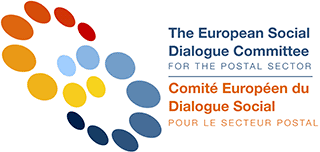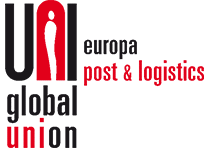THE WORLD OF WORK IN THE POSTAL SECTOR IN 2030
CONTEXT
The development of new technologies do and will impact work organization which will be a reality in the close future for the postal sector. As the same time, new trends as more horizontal work organizations, increased flexibility, new balance between private and professional life will impact the world of work in the long term within the framework of larger evolutions of the society; Today the postal sector is indeed at the crossroads of several activities and the growing diversification of postal operators is supported by a relevant social transformation which will continue in the upcoming years. Postal operators need to adapt their work organization to the new challenges. The Covid-19 crisis has certainly accelerated some of these transformations.
IMPLEMENTATION
The project will last 24 months, and will be divided in three phases:
Stage 1 - Dec. 2020-April 2021: Preparatory phase:
· Step 1- Selection of consultants: The first step of the project will consist in the selection of consultants who will support the project during each stage. In the framework of the project, we will require a two-fold support from external consultants.
· Step 2 - Kick-off meeting: In order to formally launch the project and to align on its main objectives, the kick-off meeting will gather the selected consultant team together with the project team. The Main outcomes are establishing the framework of the project; aligning on the study and facilitation methodologies.
Stage 2 - May 2021 – June 2022: Digital events, online platform and workshops
· Organisation and conduction of 4 workshops and 4 virtual events: As regards the digital part of the work, we foresee 4 digital sessions in the framework of virtual conferences which will be organized in-between each physical meeting; some interpretation will be offered in this framework.
Ø 8 December : virtual workshop 1
Ø 23 February: virtual workshop 2
Ø 30 March - 1 April in Zagreb : physical workshop 1 (Scenarios 1 & 2)
Ø 21-22 June in Vienna : physical workshop (Scenarios 3 & 4)
· Coordination of the collaborative platform work: At the same time, a digital platform will be put in place to enable continuous exchanges (e.g. polls, word clouds) between participants and parallel contributions.
· Conduction of workshops and of virtual events: A Steering Committee meeting took place on 9 June in Brussels about Methodological discussion.
Stage 3 - June- Dec.2022: Conclusions and follow-up
· Final conference: The final conference will enable to present the different postal characters identified in each scenario to a wider audience, including PostEurop, UNI Europa and CESI representatives as well as representatives from the European institutions. It will discuss opportunities and risks for the different job areas.
· Final report and dissemination toolkit: The final report aims at presenting the main outputs from all the workshops and at formalizing the European social partners’ conclusions in order to disseminate them to a large audience from within and outside the sector. Besides the detailed final report, a toolkit to support the dissemination of the project’s results within each organization is foreseen.
NEXT WORKSHOPS
The Third physical workshop will take place in October/November 2022. The discussion will focus on the Scenario 5 with wild card scenario. 1 additional physical workshop will be organised to discuss about the need to further work transversally on the postal characters: enrich, compare, prioritize… As well as 2 virtual workshops on the issue “How to make the best use of the virtual events?”
The Final conference will be during S2 2023.
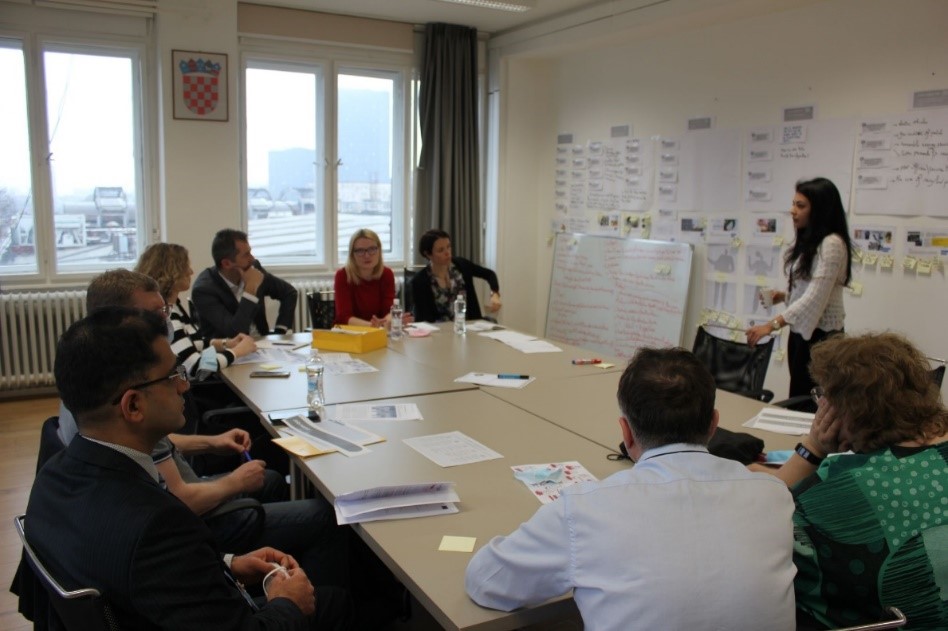
Trend research for the postal sector in 2030
PROJECT IMPLEMENTATION
The project has been conducted by a team composed of social partners from PostEurop. The objectives were several. It aimed first of all at elaborating 3 to 5 scenarios on what will be the postal sector in Europe in 2030. This project also aimed at bringing in a new working method into the processes of the Committee. The project was implemented through four main important events running from May 2018 to June 2019:
· 29-30 May in Paris: aimed at building the list of key factors that would influence the future of the sector.
· 1-2 October in Bonn: in order to describe the possible evolutions of these key factors.
· 22-23 January in Warsaw: in order to build the scenarios
The final step of the project was the final conference organised in Brussels on 18 June. The objective of this event was to disseminate the project outputs to a wider audience.
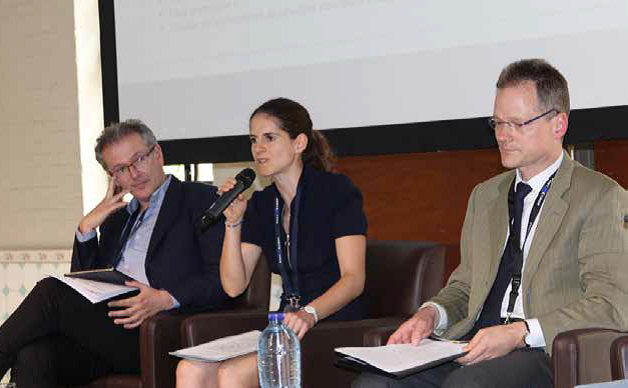
METHODOLOGICAL APPROACH:
In times of growing uncertainty and complexity, demands for strategic planning are also changing. More than ever, it is important to be prepared for disruptions, surprises and alternative outcomes.
Through all these steps, the European social partners were actively involved in the discussions to have a confrontation of different viewpoints as breakout sessions and small working groups were organised during each workshop. Eventually one of the priorities was to push participants to think out of the box in order to have an eye-opener. The interactive nature of the discussions was really an innovative exercise for the European social partners and enable to put in practice social dialogue with constructive exchanges. Scenario development is at best process and dialogue oriented. A scenario represents possible future world, including the development paths leading to this future World. Scenarios are not forecasts but plausible possible future images that contain various strategic implications.
Process overview:
v STEP 1 ENVIRONMENTAL ANALYSIS - List of 21 Factors on global and European Level
v STEP 2 KEY FACTOR ANALYSIS - List of 12 Key Factors: Paris Workshop: Agreeing on key factors
v STEP 3 KEY FACTOR PROJECTIONS - Morphological Box: Bonn Workshop: Agreeing on scenarios and enrichments of scenarios + 4 Experts Interviews
v STEP 4 SELECTING RAW SCENARIOS - 5 Raw Scenarios
v STEP 5 SCENARIO CONSTRUCTION - Final 5 Scenarios: Warsaw Workshop: Agreeing on scenarios and enrichments of scenarios
v STEP 6 STRATEGIC DERIVATIONS - Policy Recommendations: Brussels Final Conference; Agreeing on risks and strengths of scenarios, first recommendations
THE SCENARIOS
A total of five alternative scenarios have been developed, covering a broad future opportunity space.
· GREY SCENARIO: “STANDARDISED SOCIETY” Renewal of social dialogue with new forms of labour organisation and bargaining in a society that is transforming rapidly by leveraging digital technologies to manage disruptive technological and ecological change.
· PINK SCENARIO: “ECHO CHAMBER SOCIETY” The end of the traditional social dialogue between unions and employers in the postal sector in a highly digitalised and individualised niche society and economy, in which new players in the postal sector set the tone
· BLUE SCENARIO: “ADAPTABLE SOCIETY” Attempt to perpetuate existing social dialogue formats through incremental adjustments in a slowly reacting society and economy, in which new realities are gradually integrated.
· PURPLE SCENARIO: “VICIOUS CYCLE SOCIETY” Slow deterioration of social dialogue in a society marked by tension and a decline of solidarity amidst economically hard times.
· ORANGE SCENARIO: “INNOVATIVE SOCIETY” Reinvigorated social dialogue using new approaches as a key driver for managing difficult societal and economical transitions in an innovative and socially conducive way.
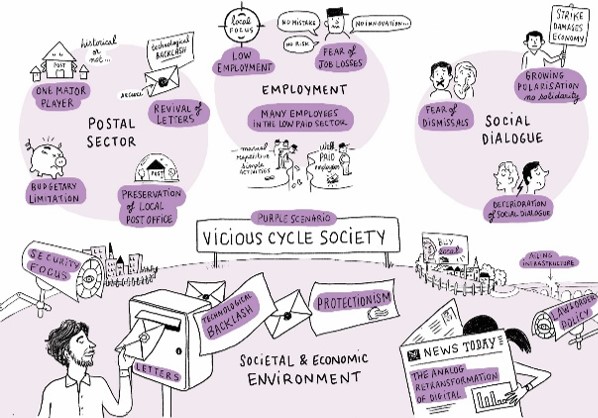
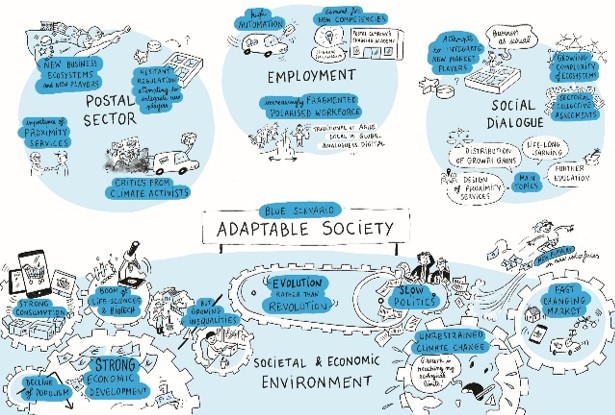
2015-2016 Project, “Mobilising social partners in a new context”
The EU-funded project has been conducted by the SDC in 2015-2016 and focused on two major topics:
- A training seminar on e-commerce new services which took the form of a two day learning seminar addressed to the European social partners of the sector. The seminar presented theoretical data on the main challenges in the sector, the e-commerce market and value chain together with illustrations brought by national testimonies from operators’ and unions’ experts. Its primary objective was to inform and educate the social partners comprehensively.
- A study of the collective labour agreements within a selection of 16 national postal operators. The objective is to analyse general content and process of collective bargaining which aims at supporting the change process of postal operators and trade unions and the transformation in social terms. It consisted of a survey of the results of social dialogue at national level through desk research, the dissemination of a questionnaire to a selection of 16 EU operators and the respective trade unions, together with complementary interviews with each of the questionnaire respondents, from both employers and trade unions. This survey has been organised with the support of a consultancy company which will conduct the research and analyse its results.
Final conference of the project, 24-25 May 2016 in Bucharest, Romania
This event gathered more than 50 participants, employers' and trade unions' representatives from more than 18 EU-countries. Dominique Bailly as Chair of the SDC and Brian Scott as Vice-Chair of the SDC moderated the event. Thijs Viertelhauzen from Ecorys, the consultancy supporting the SDC on this project, presented the main outcomes of his analysis and transversal analysis of social transformation strategies.
The conference was organized around 7 sessions:
(Click on the highlighted areas to download the presentations)
- Overview of the main social evolutions in the postal sector with a presentation from the consultation Ecorys
- Employment
With presentations of the Spanish case study by Violeta Arganda from CCOO and of the Portuguese case study by Jose Oliveira from SNTCT
With presentations of the Dutch case study by Ger Deleij from FNV Dutch and the Italian case study by Cinzia Maiolini
With presentations of the Polish case study by Wieslawa Mazarska from Solidarnosk/Polczta Polska, of Swedish case study by Jens Saverstam from SEKO and of the Finnish case study by Lena Muller Salonen from PAU.
With presentations of the Austrian case study by Ursula Bachmair and of the French case study by Dominique Bailly
With presentations of the Romanian case study by Irina Purcaru from Posta Romana and Cristi Iancu from Postal Workers Union Romanian and of the UK case study by Chris Bennet from CWU
